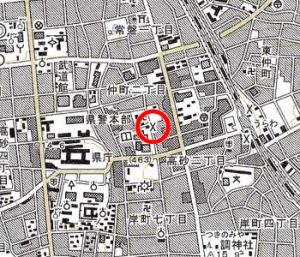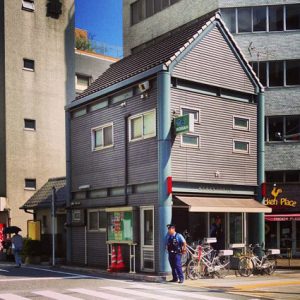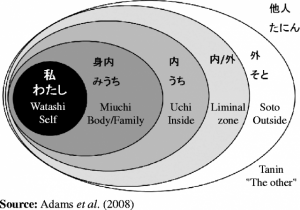In the Oct 24th’s lecture, we talked about the post war cities. I found that Koban (the policebox) is a very interesting thing to talk about. While we do not have such authority in Canada. In this blog reflection, I will talk about something I knew about Koban.


(Oficial symbol for Koban used in Japanese map, source: www.gsi.go.jp/KIDS/map-sign-tizukigou-h05-01-11kouban.htm)
Koban is known as policebox, also is the smallest organization of Japanese police system. This system is unique to Japan, and the network of Koban can be found in almost every neighborhood throughout the whole country. There are more than 1200 Koban in Tokyo area alone. They usually locate near train station in the main commercial district as well as the entrance of neighborhoods.

(Sugabashi Koban police box, Taito ward, Tokyo, source: www.japanvisitor.com/japanese-culture/koban)
As for the history of Koban. The contemporary Japanese police system established in 1874 when Meiji government needed a centralized European-style police to replace the samurai police force (Edo period 1603-1867) in order to reinforce its authority through the country.
One year ago, I have taken a course which main topic is about Japanese society and culture. Koban was mentioned in the lecture. The instructor described that the Koban has functions as following:
Firstly, Koban can provide services such as direction and translation. Due to the complex postal system in Japan. It is hard for people from other places to find the exact location of the destination. Thereby, the police in Koban can provide map and give direction to people that are unfamiliar to local streets layout. Furthermore, if you are a tourist from foreign country who cannot speak Japanese but you need some urgent help. Generally speaking, you can find police officers in Koban, and they may help you in English or they may have other documents available in English as well.
Secondly, Koban also has the function to do the crime reports. Koban are located in the communities through the country (which means each community has one Koban generally). Therefore, when crime happens, Koban can get the report quickly so on they can despatch the police force faster.
Thirdly, Koban also helps to maintain the social order in the community. In that lecture, the instructor told me that there are three forces in local community to maintain the social order: Police (Koban), Yakuza (Japanese mafia) and community committee. Usually, the police officers in the Koban of local community would get familiar to each resident of the community. And when people that they are not familiar trying to enter the community, the police will be more careful and watch out for those people. The instructor of the course regarded it as an application of the ideology of Uchi (inside) and Soto (outside). Uchi (inside) is refer to home or community, and the Soto is outside world. They think Uchi is clean and safe while Soto is dirty and dangerous. In this case, I think it also can relate to the social exclusion that we talked about in this course.

(The ideology of Uchi/Soto, source: chubeny.weebly.com/life-in-japan.html)
Fourthly, Koban can served as a lost and found location. When you lost something around the community, you can try to find some help in the local Koban. Or when you pick up something, you can send them to the nearest Koban. It can be very convient to local people who live in the community.
But Koban is also face many challenges nowadays. With the more up-to-dated technology, people may use more digital map and translation application in their mobile phone rather than finding a Koban and talking to a police officer. Furthermore, the aging society would lead to a shortage of labor. It may affect the work of Koban
References:
Joy Hendry (2013). Understanding Japanese Society. ISBN 0-415-67914-1
Jones, Trevor; Tim Newburn (2006). Plural policing. Routledge. pp. 232–33. ISBN 0-415-35510-9.
http://www.japanvisitor.com/japanese-culture/koban
https://www.jnto.go.jp/eng/basic-info/emergency-info/police-box-koban-system.html
https://en.wikipedia.org/wiki/K%C5%8Dban
